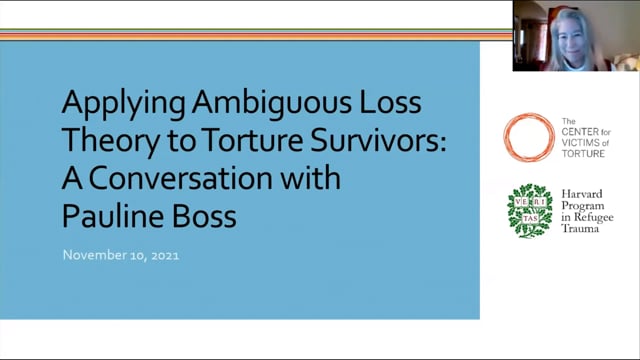Description: Survivors of torture have endured multiple and often catastrophic losses – loved ones, home, identity, culture. Some of these may be understood as Ambiguous Losses – a loss that occurs without closure or clear understanding. According to Dr. Pauline Boss, “Human relationships are ruptured indefinitely by ambiguous loss, causing trauma and frozen grief. While discussions of this unique kind of loss are relatively new in professional texts and training courses, the ambiguous loss model is now being applied and researched widely in the United States and internationally.”
Purpose: The overall purpose of this webinar is for participants working with torture survivor clients to consider how principles of Ambiguous Loss theory apply to our clients and how to apply those principles in direct practice. Two cases of two torture survivor clients will be presented and Dr. Pauline Boss will respond to each case with an Ambiguous Loss perspective followed by participant discussion and questions.
Objectives:
After attending this webinar participants will:
- Define Ambiguous Loss and consider how Ambiguous Loss theory applies to clinical work with torture survivors
- Identify the six Ambiguous Loss therapeutic guidelines and consider how they apply to torture survivors
- Implement at least two Ambiguous Loss interventional concepts with torture survivor clients
Resources:
- Boss, P. (1999). Ambiguous loss: Learning to live with unresolved grief. Harvard University Press. (paperback-2000).
- Boss, P. (2006). Loss, trauma, and resilience: Therapeutic work with ambiguous loss. W. W. Norton.
- Boss, P. (2011). Loving someone who has dementia: How to find hope while coping with stress and grief. Jossey-Bass.
- Boss, P. (2021). The myth of closure: Ambiguous loss in a time of pandemic and change. W. W. Norton. (in press)
- For order information, see www.ambiguousloss.com.







